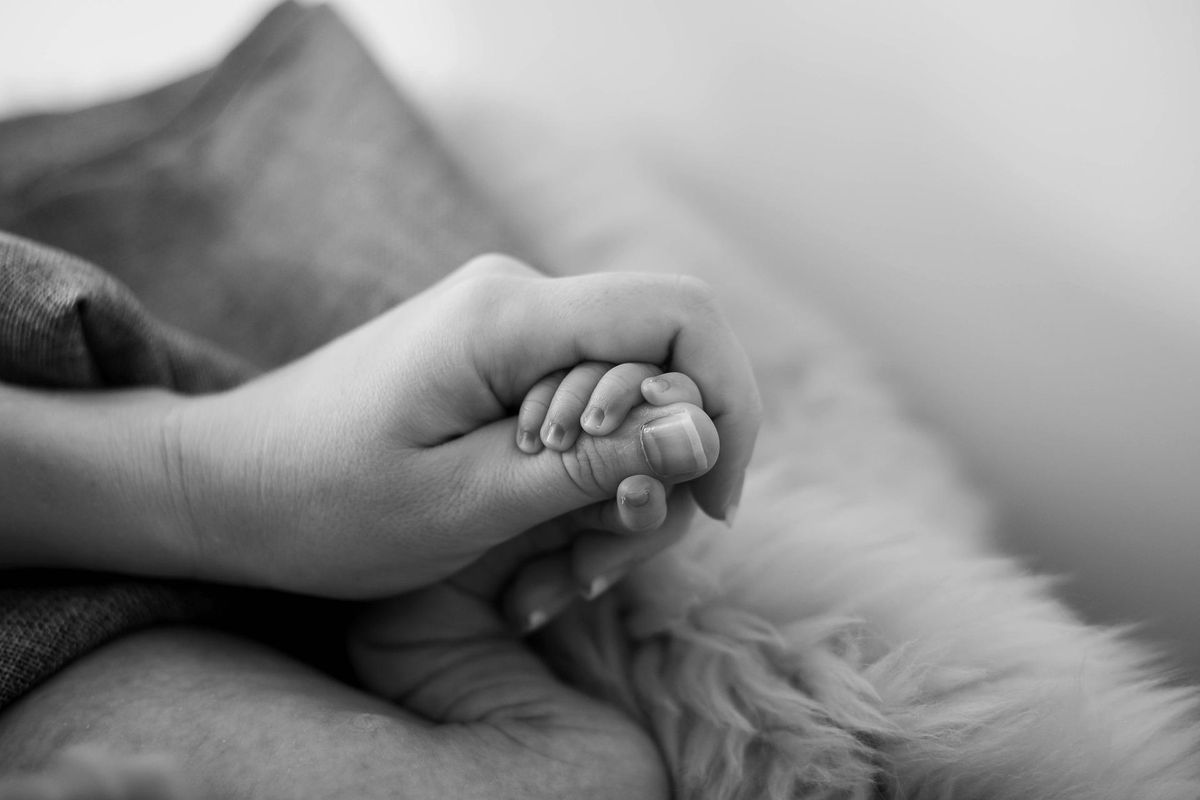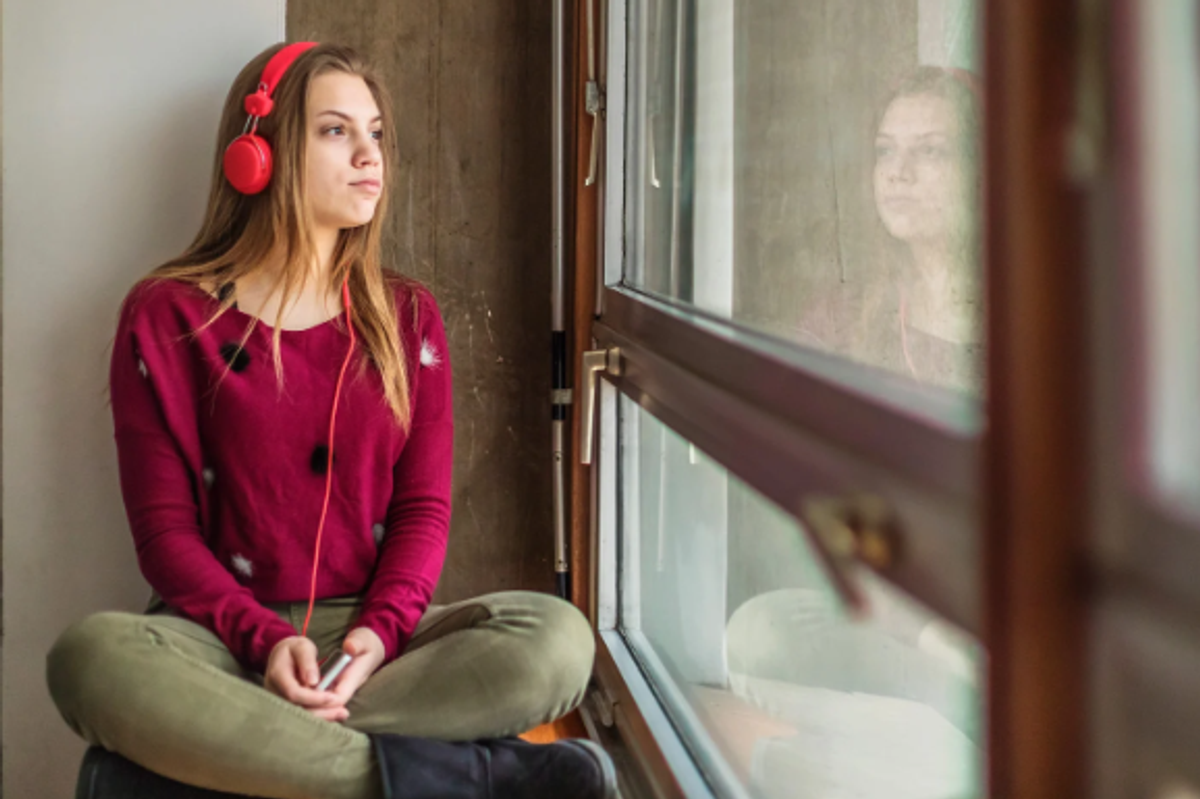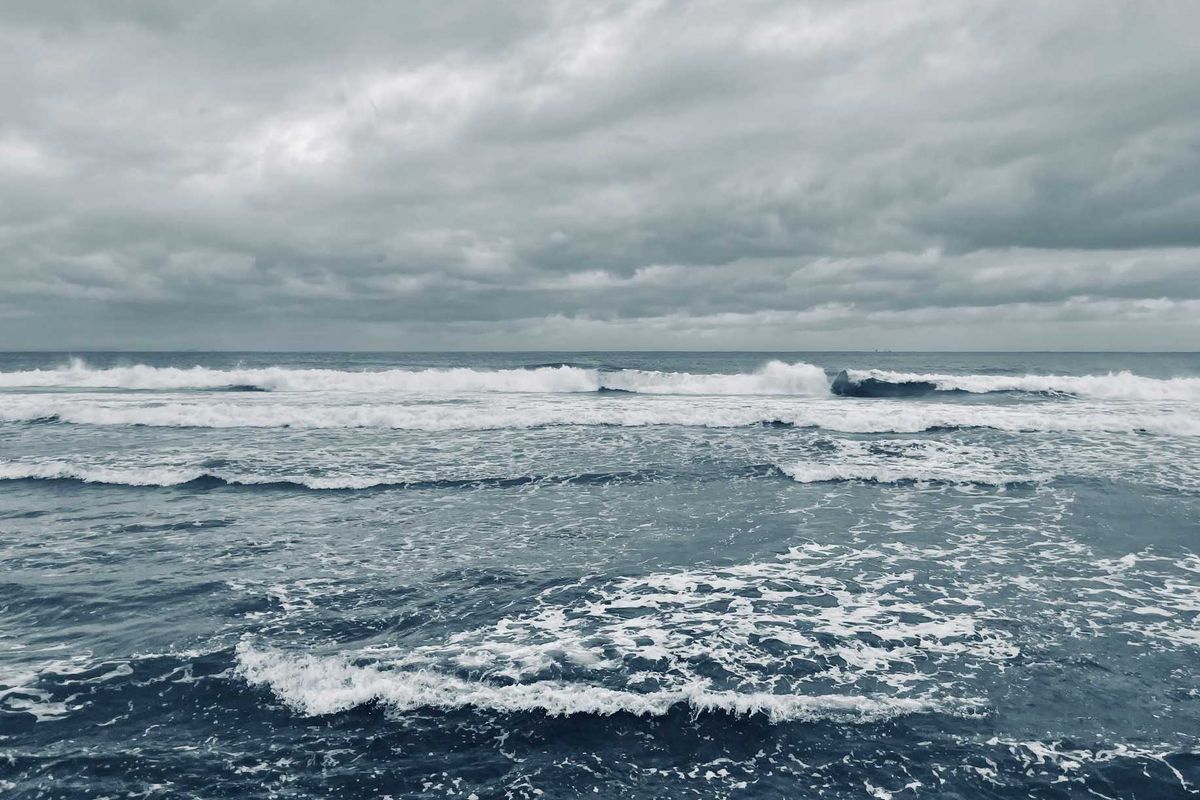
I still miss her.
My mother died from ovarian cancer when I was a young child.
I'm in my late 30s now, and I'm still navigating this loss as I move through life. I've lived most of my life without my mother at this point, but I still miss her.
Here are three things I've learned since losing Mam:
1. Grief is not linear and is not solely expressed through tears.
Someone you love has been taken away from you, and your heart has broken into pieces. It's natural to grieve, but we all grieve differently. Grief shows up in anger, sorrow, guilt, fear, and sometimes peace. It is unpredictable and, at times, exhausting.
I cried when my mother died, and I cried at her funeral when my school choir sang "Be Not Afraid." I didn't cry much in the immediate years that followed — not directly as a result of Mam's death, but probably indirectly related to it. I certainly felt fear and anger and other emotions related directly to my loss.
Then sadness hit me like a ton of bricks one day when I was in my early 20s. A compassionate friend asked me about Mam, and as I hadn't spoken about her to anyone outside the family, I broke down. It was a good release. The years have brought many stages of grieving.
Mother's Day is never easy. Shopping for my wedding dress without my mother brought up intense feelings of loss. And sometimes it just hits me hard, on a regular day, yanking me out of my pleasant thoughts. A mother in a dressing room with her daughter, and they're trying on clothes together, admiring how the other looks. The mother telling the daughter how beautiful she is.
Or a friend of mine, meeting her mother for lunch and I can't even imagine what that would be like! I can't even fathom the amazing joy of having lunch right now with Mam! And then I get that heaviness in my chest and my stomach feels bad.
There's no closure. My grieving stems from having loved so deeply. I have learned to tune into the emotions I'm feeling and to acknowledge the love, the pain, and the loss.
2. There are no replacements.
Nobody can replace your mother. We love our mothers in our own individual ways. Our mothers care for us when we're sick, guide us in life the best ways they can, listen to us, and love us unconditionally.
For a mother, her child is always her first priority. And we sense this. We feel it. We know it, even if she doesn't say it.

I was told that she called me her little angel.
Photo provided by author Carmel Breath.
My mother was beyond happy when I was born a healthy baby girl. I was told that she called me her little angel. She carried me in her womb for nine months.
By the time I was born, we had that unbreakable bond, and she knew me from that first second of my existence. There's never going to be a replacement for that person who loved me probably more than she loved herself. The joy in her eyes when she saw me, the warmth of her arms wrapped around me, the pain in her eyes when she had to say goodbye are all ways that I remember the deep love she had for me.
Mam prepared lunches for me every day to take to school, named muffins after me because they were my favorite, and surprised me with the best doll she could find when I was a few years old. She repaired my soft toys when they tore, taught me to have manners and sit up straight, wiped my eyes when I cried and my nose when I was sick.
Today I look for certain qualities in people. I look for a warmth, a radiance, a compassion and kindness that Mam had. I look for humor, a voice of sense, and strength of character. These are traits that my mother had. I find some of them in others.
But it's never the same. There'll never be another Mam. She's irreplaceable on so many levels.
3. There are other people who will love you and other people for you to love.
Family members and friends will love you. They might not know exactly what your needs are or how to address them, but it's worth reaching out to them. People struggle with different things.
Perhaps family members cannot love you or be there for you, and we may have to look around, let go, and reach further than we might want to in order to find the people who really love us, but there is someone out there to love you, and there's someone in need of your love.
I was blessed with the kindest, most devoted father who gave my brother and me all the love and care we needed. My dad is a gem in my life. He calls me to hear my news and to share his. He worries when I'm not feeling good and is overjoyed when I'm happiest. He listens to my concerns and trusts me to make the right decisions.
My dad has helped me so much in dealing with my loss, through caring for me and loving me unconditionally. I have the most wonderful fiancé who loves me to no end. And I've friends in my life who I know truly care about me.
I've been blessed with a lovely family, but it doesn't mean that I don't reach out to others. I've reconnected with old friends after years of distance. I've discovered things I have in common with others and opened up to new friendships.
Having people to love is truly healing. I was a kindergarten teacher for 10 years. I loved the children in my care, and they showed me so much love in return. By spreading love, we invite more love into our lives. Try volunteering or working in a school or a hospital. There are people everywhere in need of love.
Our world is so big and yet so small now in this age of technology. We can reach out to others across continents.
Our mothers were the first to show us the true meaning of love. In honor of our mothers, let's spread that love wherever we can.
This article originally appeared eight years ago.



 Millennial mom struggles to organize her son's room.Image via Canva/fotostorm
Millennial mom struggles to organize her son's room.Image via Canva/fotostorm Boomer grandparents have a video call with grandkids.Image via Canva/Tima Miroshnichenko
Boomer grandparents have a video call with grandkids.Image via Canva/Tima Miroshnichenko


 Information from the NICABM website regarding the "Window of Tolerance."Photo Credit: The National Institute for the Clinical Application of Behavioral Medicine
Information from the NICABM website regarding the "Window of Tolerance."Photo Credit: The National Institute for the Clinical Application of Behavioral Medicine  Waves cycle in the ocean. Photo by
Waves cycle in the ocean. Photo by
Gen Xers and Millennials share 17 of the strangest things their Baby Boomer parents do
"My mom writes her emails in MS Word, then attaches the Word document to the email."
A Baby Boomer couple.
Generational fights have raged since the dawn of time, and a recent spat between Millennials and Baby Boomers is no exception. Baby Boomers, who raised Millennials, accuse the younger generation of being entitled and irresponsible with money. At the same time, Millennials accuse Boomers of having it easier economically while making it harder for those who came after them.
Where is Gen X in the battle? Probably off in the corner somewhere, saying, "Whatever." Aside from the generational sniping, there are some things the older generation does that are just plain baffling to younger people. Whether it's outdated worldviews, a refusal to adapt to modern technology, or a lack of self-awareness, Baby Boomers can do some strange things.
To help the younger folks get over their frustrations with parents from the "Me Generation," a Redditor asked: "What is the most Boomer thing your parents still do?" The stories were pretty funny and relatable, showing that almost everyone with parents over 60 is dealing with the same thing.
Here are 17 of the "strangest" things people's Baby Boomer parents do:
1. Phones on full blast
"Play iPhone slot machine games at full volume in the doctor’s office."
"My dad pretty much exclusively has his phone on speaker, and just walks around in public talking with it at max volume (and talking really loud himself). I’m like 'Dad, the entire supermarket doesn’t want to listen to you, and Uncle Jim complains about how often you have to pee.'"
2. Still using checkbooks
"My mom balances her checkbook every week. They still have a landline."
"And she probably has way more money than you will until she dies!"
3. Email issues
"My mom writes her emails in MS Word, then attaches the Word document to the email."
"Like the email is just the virtual envelope for the digital letter."
4. Restaurant jokes
"All those little restaurant comments.
'Wow, they'll let anyone in here!' when seeing a friend at said restaurant.
'Thanks for having us, not everyone will' to the waiter at the end of the meal.
'As you can see, it was terrible' when the staff takes away the clearly entirely eaten plate.
'You're going to have me floating away in a minute' when more water is put into their glass"
5. Always have to mention race
"Constantly mentioning the race or ethnicity of everyone she mentions. Never with any negative connotation or comment, but usually, there is no reason for it to be relevant to the conversation."
"My Jewish mother will always whisper the word 'black' in case anyone hears her: 'So the nice black man at the hardware store helped me find the right garden hose.'"
6. Googling their Google
"Typing Google on Google before they Google the thing they’re looking for."
"In the Google search bar, they type Google? Lol."
7. Getting a job is a cinch
"Believing you can walk into a business and hand in a resume. If you have a college degree in any field, they'll hire you."
"Just physically hand over your resume to HR or the hiring manager. You'll make a mark and get hired!! Call the office and ask to speak to HR/Hiring Manager."
Any Millennial who argued with their Boomer parents about how hard it is to land a good job should feel vindicated by a 2022 study, which found that most older Millennials didn't secure good jobs until their early 30s, while most Boomers did so in their 20s. "To secure a good job, young adults need to acquire more education and high-quality work experience than was necessary for previous generations," the researchers wrote.
8. Why are they together?
"Stay married forever while they behave like neither one of them can stand each other."
"I'm on the other side of that. After my mom passed, my dad now acts like their marriage was picture perfect and they were the love of each other's lives, even though they couldn't stand each other for at the very least 40 of the 54 years they were married."
9. Collectables or hoarding?
"Think their 'collectibles' are truly valuable."
"My mom insists her Hummels are going to put my kids through college!"
"Mine are the Thomas Kincade paintings. She has a Victorian glass piece that might actually be worth something, but those damn paintings are the real investment."
10. Can you grab the mail?
"Ask me to bring in the mail when they go away for more than 24 hours."
"My parents think everybody is standing at the door waiting for the mailman every day, and don’t believe me when I tell them that some people go days without checking their mail. They think everybody is waiting for the mailman every day because 'somebody might send them a check.' Like, really?"
11. Zero responsibility
"'Well, I guess I was just a bad father.' Yeah. That attitude of anti-responsibility is exactly why 3 out of 4 of your children don't talk to you."
"Ha! Have the same dad, do we?"
12. Comment on people's appearance
"Comment on EVERYBODY’s body/appearance/weight. The first thing my dad does after not seeing me for a year is poke me in the gut and tell me how fat I am."
13. Boomer panic is real
"Literally throwing their hands up in a panic when they don't understand something. Where did they learn that?"
"Or just saying 'well, I don't know', especially when that comes right after you explaining it and showing them how to do something, with them nodding along and asking relevant questions all the way through."
In a video by YourTango, editor Brian Sundholm tried to explain Boomer panic in an empathetic way: "Most of us nowadays know the importance of recognizing and feeling our emotions." Sundholm then quoted therapist Mitzi Bachman, who explained that when people struggle to express their emotions, it can result in an "unhinged" reaction.
14. Annoying Facebook posts
"Post nonsensical rants on Facebook for other boomers to like, share, and comment. Often these rants are political, but not always. Basically cringe-fest."
"Most people won't do it, but share this post if you believe in god and freedom."
"I do NOT give Facebook permission to use my photos and personal information!"
15. Dinner pushers
"While we're eating breakfast. What do you want to do for supper?"
"Can't we enjoy this meal without worrying about the next?"
16. They print everything
"My boomer in-laws print EVERYTHING! The number of times I have said, 'quit wasting ink, email it to me, or text me the link. Or just text me the schedule, don't print it out.' GPS on their phones? Nope...print a map."
"Boomers and their paper man. My dad has finally started using the internet, but he still prints everything he likes. Like he'll see a boat listing on Craigslist and print the entire page, including a massive color photo of it, and he's definitely not going to be buying it either. He's got a stack of papers that is the internet that sits by his recliner. He just sits there with Fox News on (though it's usually muted for some reason, that's a plus) and looks at his papers."
17. Flirting with servers
"My dad is 77 still flirts with the young waitresses. It's f**king weird for everyone."
"He thinks he is in cute old man territory, but he is not."